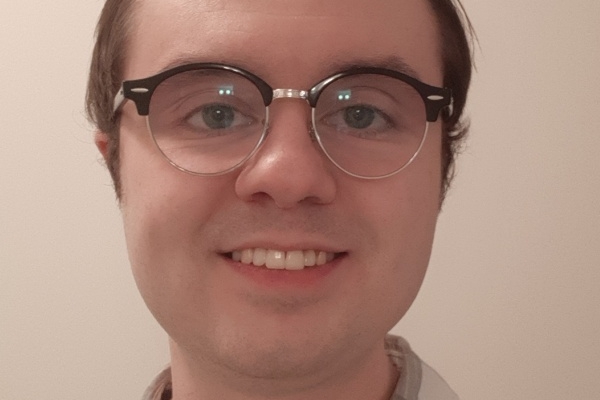
Envisioning a new future for accessibility in Canada
Matthieu Petit had come to a crossroads in his academic career after finishing his honours undergraduate degree where he did research re-conceptualizing disability policy through existential philosophy. At the time, he was considering pursuing a master’s in philosophy or looking at becoming a public servant or policy maker.
By Scott Larson for JSGSTo get help with the decision Petit spoke to one of his mentors, a professor at Ryerson University, Bryan Evans.
“I wanted to make a difference for people with disabilities and he recommended Johnson Shoyama specifically,” said Petit, who is living with cerebral palsy. “Public policy is going to be the way you will make the most change because you are getting directly involved in the creation and design of programs.”
Petit recently finished his Master of Public Policy course work and is now working on his thesis, ‘Re-thinking disability: An investigation to strengthen the foundations of accessibility legislation and policy in Canada.’
Petit is studying the federal Accessible Canada Act passed in 2019, and is looking at ways to remove the barriers to full participation in work and society that disabled Canadians currently face.
“It [the Act] aims to eliminate barriers in the services and programs the government offers,” Petit said. “My thesis is looking at the model they are using, sort of a barrier-free model which is based on the social model of disability. It looks at disability, not as a medical or biological impairment, but as resulting from discriminatory attitudes and our built environment.”
“So things that are present in society as opposed to medical issues with the individual,” he said. “By eliminating the barriers in society we can get rid of the negative consequences of disability.”
That’s a tall order as some provinces have their own versions of accessibility legislation as well. And, he said provinces also have more impact in the day-to-day lives of its citizens.
For example, they regulate most of the private sector.
“A lot of it is ideological,” said Petit, who has been involved in advocacy campaigns to have the Alberta government pass accessibility legislation.
“It seems like they are nominally in favour of accessibility legislation, but their own vision of what that would look like is very, very restricted, especially as it pertains to the private sector,” he said. “They see it as more red tape for corporations.”
Advocates for better accessibility point out the more accessible you are, the more talent there is available to hire.
“In Canada right now we have issues with our labour market and an ageing population, so people with disabilities are going to be one factor among many that will contribute to that solution,” he said. “There are general economic benefits as well with more people with disabilities being integrated into the economy.”
Now the federal government wants to get all provinces on board with their initiatives to remove barriers. Petit has already contributed in that area.
As an employee of Employment and Social Development Canada, his team won the student policy design competition for a proposal to “improve post-secondary education for students with disabilities through barrier-free work placement.” Their proposal encouraged post-secondary institutions to provide students with work experience that is relevant to their field and that is going to accommodate them according to their individual needs.
Petit has researched how the “social model” arose historically. From the federal government first implementing soldier pensions in the First World War, through developments in medicine that saw disability as physiological or constitutional, to advocacy movements that came about in the seventies that saw this conventional view of disability as attributing the cause of disability and its negative consequences to something intrinsic, within the individual.
“I’m investigating how our understanding of disabilities have developed over time and comparing that to the lived experience of people with disabilities, to tease out how the two fit together and whether we can improve our approach to make accessibility legislation more effective,” Petit said. “My own view is that there is a significant physiological dimension to disability due to the ways in which our bodies figure into our personhood and the ways we navigate our lives; this encompasses the different kinds of disabilities—cognitive, sensory, etc.”
He wants to see policies that address these aspects of disability that may not be sufficiently addressed with a sole focus on barriers in the environment, such as long-term career development. Petit is now in the process of interviewing people with disabilities to inform the lived experience part of his thesis.
“Policy makers have a tendency to get hyper-fixated on certain things and it is difficult to step back and look at the bigger picture,” he said. “So I think it is important to have young people come in with new ideas.”
He says Canada needs programs that are able to foster people’s autonomy and independence. Employment programs would play a big part in that, and help alleviate the poverty faced by many people with disabilities.
He says the JSGS program has helped him better prepare himself for helping change policies that will enhance lives.
“Through the course work, you are exposed to a wide variety of material and approaches, which I found very valuable,” he said. “And the professors I found were amazing.”
Once he has finished his masters, Petit is hoping to work in government in areas related to employment and social policy.
“I am optimistic that we are going to see change, but to what degree I’m not sure.”

